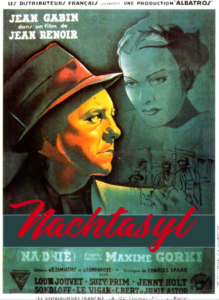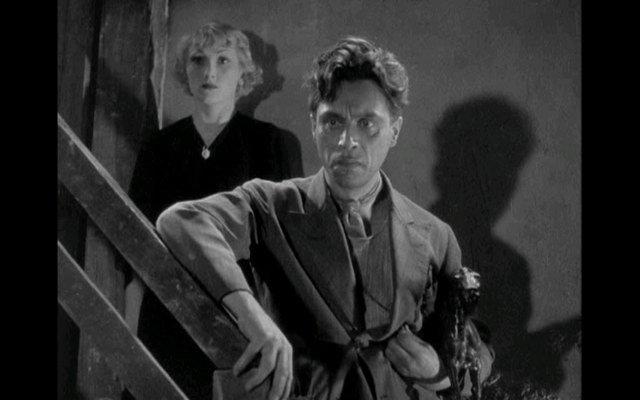“We’re born, we live, we die — it’s nothing to cry over.”
|

Synopsis:
A destitute baron (Louis Jouvet) befriends a thief (Jean Gabin) living in a flophouse, whose married landlady (Suzy Prim) is jealous about Gabin’s love for her downtrodden sister (Junie Astor).
|
|
Genres, Themes, Actors, and Directors:
- French Films
- Jean Gabin Films
- Jean Renoir Films
- Love Triangle
- Play Adaptation
- Thieves and Criminals
Review:
Jean Renoir’s adaptation of Maxim Gorky’s 1902 Russian stage play transports the narrative to the slums of Paris, effectively opening up the tale by including a lengthy backstory for one of the characters: Louis Jouvet’s impoverished baron, who remains remarkably unperturbed as he’s forced to give up his palatial residence and adopt a life of itinerant poverty. His friendship with Gabin, and his eventual residence in the flophouse run by Vladimir Sokoloff and Suzy Prim, provide the background context for the film’s central drama — Gabin’s love for Prim’s “Cinderella-like abused sister” (Astor), who is cruelly “sold” to a lascivious, blackmailing suitor (Andre Gabriello). Despite its citation as the best picture of 1936 by a “circle of prestigious French critics”, this bittersweet drama no longer ranks among Renoir’s best work — yet it’s ultimately more enjoyable than Kurosawa’s 1957 reimagining of the play, which (as noted in my review) spreads itself too thinly among the play’s ensemble characters. Jouvet is particularly notable here as the soulful baron: his plight immediately intrigues us, and serves as a welcome counterpart to the storyline’s more blatantly sordid elements.
Redeeming Qualities and Moments:
- Louis Jouvet as the Baron

Must See?
No, though it’s worth a look, and Renoir fans will certainly want to check it out.
Links:
|
One thought on “Lower Depths, The / Bas-Fonds, Les (1936)”
Not a must.
Produced and shot well, ‘TLD’ is nevertheless not a very engaging film. Not the most solid as drama, it is more of a mood piece of a downtrodden milieu – not a bad thing in itself, except that very little is done with the premise except to populate it with (more or less) one-note characters. Most of the cast have been indulged by Renoir and, as a result, there is more than a fair amount of *acting* going on. Gabin, Jouvet and Astor manage to side-step that kind of exaggeration and acquit themselves to a modest degree. But the screenplay is not a large help to anyone, causing various occasions of doing more to compensate when less would suffice.